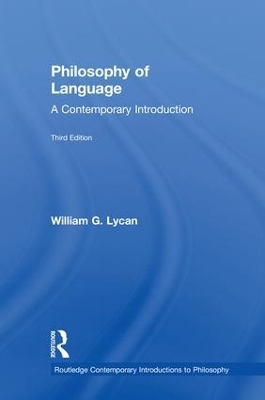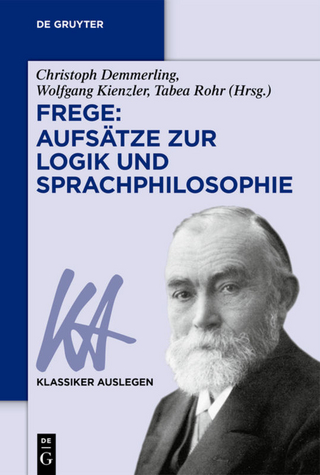
Philosophy of Language
Routledge (Verlag)
978-1-138-50457-8 (ISBN)
- Lieferbar (Termin unbekannt)
- Versandkostenfrei innerhalb Deutschlands
- Auch auf Rechnung
- Verfügbarkeit in der Filiale vor Ort prüfen
- Artikel merken
Now in its third edition, Philosophy of Language: A Contemporary Introduction introduces students to the main issues and theories in twenty-first-century philosophy of language, focusing specifically on linguistic phenomena. Author William G. Lycan structures the book into four general parts. Part I, Reference and Referring, includes topics such as Russell's Theory of Descriptions (and its objections), Donnellan's distinction, problems of anaphora, the Description Theory of proper names, Searle's Cluster Theory, and the Causal-Historical Theory. Part II, Theories of Meaning, surveys the competing theories of linguistic meaning and compares their various advantages and liabilities. Part III, Pragmatics and Speech Acts, introduces the basic concepts of linguistic pragmatics and includes a detailed discussion of the problem of indirect force. Part IV, The Expressive and the Figurative, examines various forms of expressive language and what "metaphorical meaning" is and how most listeners readily grasp it.
Features of Philosophy of Language include:
chapter overviews and summaries;
clear supportive examples;
study questions;
annotated lists of further reading;
a glossary.
Updates to the third edition include:
an entirely new chapter, "Expressive Language" (Chapter 14), covering verbal irony, sarcasm, and pejorative language (particularly slurs);
the addition in several chapters of short sections on pretense theories, addressing (1) puzzles about reference, (2) irony, and (3) metaphor;
a much expanded discussion of Relevance Theory, particularly its notion of ad hoc concept construction or "loosening and tightening," and the application of that to metaphor;
new discussion of Cappelen and Lepore's skepticism about content-dependence;
up-to-date coverage of new literature, further reading lists, and the bibliography, as well as an improved glossary.
William G. Lycan is William Rand Kenan, Jr. Professor of Philosophy Emeritus at the University of North Carolina, Chapel Hill and currently Distinguished Visiting Professor at the University of Connecticut, Storrs. His eight books include Consciousness and Experience (1996), Real Conditionals (2001), and Philosophy of Language: A Contemporary Introduction (Third Edition, 2018).
1. Introduction: Meaning and Reference Part 1: Reference and Referring 2. Definite Descriptions 3. Proper Names: The Description Theory 4. Proper Names: Direct Reference and the Causal–Historical Theory Part II: Theories of Meaning 5. Traditional Theories of Meaning 6. "Use" Theories 7. Psychological Theories: Grice's Program 8. Verificationism 9. Truth-Condition Theories: Davidson's Program 10. Truth-Condition Theories: Possible Worlds and Intensional Semantics Part III: Pragmatics and Speech Acts 11. Semantic Pragmatics 12. Speech Acts and Illocutionary Force 13. Implicative Relations Part IV: The Expressive and the Figurative 14. Expressive Language 15. Metaphor Glossary Bibliography Index
| Erscheinungsdatum | 18.09.2018 |
|---|---|
| Reihe/Serie | Routledge Contemporary Introductions to Philosophy |
| Zusatzinfo | 1 Tables, black and white; 2 Line drawings, black and white |
| Verlagsort | London |
| Sprache | englisch |
| Maße | 152 x 229 mm |
| Gewicht | 480 g |
| Themenwelt | Geisteswissenschaften ► Philosophie ► Logik |
| Geisteswissenschaften ► Philosophie ► Metaphysik / Ontologie | |
| Geisteswissenschaften ► Philosophie ► Sprachphilosophie | |
| Geisteswissenschaften ► Sprach- / Literaturwissenschaft ► Sprachwissenschaft | |
| ISBN-10 | 1-138-50457-2 / 1138504572 |
| ISBN-13 | 978-1-138-50457-8 / 9781138504578 |
| Zustand | Neuware |
| Informationen gemäß Produktsicherheitsverordnung (GPSR) | |
| Haben Sie eine Frage zum Produkt? |
aus dem Bereich


